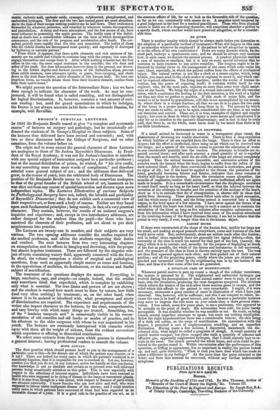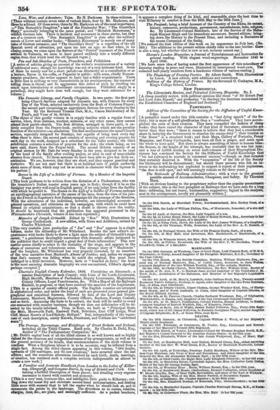PUBLICATIONS RECEIVED.
From April 3d to April 90.
Boons.
Memoirs of the Jacobites of 1715 and 174.5. By Mrs. Thomson, Author of "Memoirs of the Court of Henry the Eighth," Sec. Volume The Education of the Poor in England and Europe. By Joseph Kay, BA. of Trinity College, Cambridge, 'Travelling Bachelor of the University. Love, War, and Adventure: Tales. By IL Harkness. In three volumes. [These volumes contain seven tales of various kinds, four by Mr. Harkness, and three by a friend. Of these seven, three by Mr. Harkness are of the most importance, —" Don Bernardo's Daughter," a tale of the Peninsular War; "The Guerrilla's Story," nominally belonging to the same period; and "Heinrich Heinemann," a wildish German tale. There is incident and movement in these stories, but they are of a common cast. "Don Bemazdo's Daughter" is done after the military novels of Lever and similar books; "Heinrich Heinemann" is merely one of many tales of German romance; and "The Guerrilla's Story" is a repetition of the old Spanish novel of adventure, put upon too late an age; so that when' in its dosing scenes, we come upon the horrors of the "Patriot" massacre of the French settlers in Valencia, we seem to have passed suddenly into a totally different region from that which bred the old Spanish rogue.]
Pen and Ink Sketches of Poets, Preachers, and Politicians. [A series of articles giving an account of the writer's reminiscences of a variety of celebrated men; though his knowledge was not of a very intimate kind. Some of them he merely saw for a short period—as Abernethy at a consultation or at a lecture, Byron in his coffin, or Paganini in public: with some, chiefly Noncon- formist preachers, the writer appears to have had a faller acquaintance. There is little that is striking or very characteristic in his reminiscences: his manner of telling them is literal; and he aggravates this defect of style by dwelling too much upon introductory or subordinate circumstances. Published singly in a periodical, they might have done well enough, but they want substance for a volume.] The Domestic Liturgy, and Family Chaplain. In two parts: the first part being Church Services adapted for domestic use, with Prayers for every Day of the Week, selected exclusively from the Book of Common Prayer; the second part comprising an appropriate Sermon for every Sunday in the Year. By the Reverend Thomas Dale, M.A., Canon Residentiary of St. Paul's, and Vicar of St. Bride's. [The object of this goodly volume is to supply families with a regular form of service when, from distance, weather, sickness, or any other cause, they cannot
attend parish-church. The first division, arranged in three parts, is en- tirely compiled from the Prayer-book, omitting subjects which are the peculiar function of the minister—as absolution. The first section contains the usual Church service, especially designed for Sundays, but capable of being used every day when there is time; the second part consists of morning and evening prayers for each day in the week, designed as a substitute for the fuller service; the third subdivision contains a selection of prayers for the sick; the whole being, as we have said, drawn from the Prayer-book. The second division consists of an original sermon by Mr. Dale for every Sunday in the year., designed to be read by the head of the family after evening prayer, or used in case of unavoidable absence from church. To these sermons we have been able to give but little ex- amination. We see, however, that they are short, and they appear practical and hortative. We are not sure but there is an habitual tone of pulpit authority about some of them, which may not be so much in character with the layman in his parlour.]
Scenes in the Life of a Soldier of Fortune. By a Member of the Imperial Guard.
[This book professes to be written from the dictation of a Piedmontese' who was the translator's Italian master some years ago in Italy; though if it be so the foreigner was pretty well read in English poetry, if we may judge from the facility with which he quoted it. TheScenes in the Life of a Soldier of Fortune embrace an autobiographical narrative of the career of the hero, from the time of his join- ing the French in Napoleon's first Italian campaign till the passage of the Beresma. With the adventures of the individual, however, are intermingled accounts of general operations and criticisms on the campaigns, with which he could have forraed original acquaintance; so that a doubt is thrown over the reality. It should be mentioned that the publication has appeared piecemeal in the Worcestershire Chronicle, whence it has been reprinted.]
Memoirs of Joseph Grimaldi. Edited by " Boz." With Illustrations by George Cruikshank. A new edition, with Notts and Additions, revised by Charles Whitehead.
[This very readable joint production of "Joe" and "Boa" appears in a single volume, under the editorship of Mr. Whitehead. Besides the new editor's ac- quaintance with books likely to throw a light nylon the subject of Grimaldi's stage career, "a gentleman thoroughly conversant with dramatic affairs intimated to the publisher that he could impart a great deal of fresh information." This new matter seems chiefly to relate to the statistics of the stage, and appears in the shape of numerous and voluminous notes. The strange story of "Mackenzie"
" andi the burglary, Mr. Whitehead has very properly corrected, by an insertion of the true narrative from Mackours Abuses 0/Justice; and unless we suppose that Joe's memory was failing when he noted the original, Box must have indulged in a little invention. However, facts or "founded on facts," the book is the most amusing driunatic biography we ever encountered, Cibber's Apology perhaps excepted.] Churton's English County Kalendar, 1846. Containing an Almanack ; a
concise Description of each County; with Lists of the Lords-Lieutenant, High Sheriffs, Members of Parliament, Deputy Lieutenants, Magistrates, County Officers, Legal Functionaries, &c. With a Map of all the Railways finished, in progress, or that have received the sanction of the Legislature. This' is a species of county official guide. The English counties are arranged in alphabetical order, and under the head of each are presented some general geo- graphical and statistical features, followed by lists of the Lord and Deputy Lieutenants, Members, Magistrates, County Officers, Bankers, Foreign Consuls, and so forth. Assuming the facts to be correct, the book will be useful to every one connected with country business, though we dare say deficiencies will be de- tected by the locally informed. Thus, in Kent, we have as "Principal Seats, the Mote, Mereworth Park, Eastwell Park, Belvidere, East Cliff Lodge, West Cliff Mount Norre's of Lord Rokely, Holland." But, independently of the vague- ness of such description, Barely Knowle, Penshurst, and Cobham are "celebrated seats."] The Peerage, Baronetage, and Knightage of Great Britain and Ireland; including all the Titled Classes. Sixth year. By Charles R. Dodd, Esq., Author of "The Parliamentary Companion," &c.
1. Mr. Dodd's capital book of all the titled classes is so well known and so highly valued for the clearness and comprehensiveness of its arrangements, as well as for the general accuracy of its details, that recommendation of the sixth volume is needless. What a Sisyphean label. it is to be accurate, may be inferred from a single fact. Among the titled classes appearing in this volume, "584 deaths, upwards of 150 marriages, and 65 new creations," have occurred since the last edition; and the numerous alterations involved by each birth, death, marriage, or creation, has rendered such a complete revision indispensable as almost to create a new work.] A Familiar and Accurate Handbook from London to the Lakes of Gkngariff, and Gouyane Barra, by may of Bristol and Cork. Con- taining a faithful Description of these places; and detailing every expense necessary to travel with comfort and economy. [.This is a very neat, business-like, and intelligible little guide to Killarney; cut- bmg down the usual dry and elaborate second-hand antiquarianism, and dealing little more with scenery than to tell the reader what he should look at, and to enumerate the paints in the landscape.. The directions as to routes vehicles, charges, inns, &c., are plain, and seemingly sufficient. As a pocket 'brochure, it appears a complete thing of its kind, and seasonable, since the best time to visit Killarney in comfort is from the 20th May to the 20th June.] The Punjaub; being a brief Account of the Country of the Sikhs, its extent, history, commerce, productions, government, manufactures, laws, religion,&c. By Lieutenant-Colonel Steinbach, late of the Service of the
Malia-
rsjah Runjeet Singh and his immediate successors. Second edition; bring- ing down the History to the Present Time, and including a Narrative of the recent Campaign of the Sntiej.
[We noticed the first edition of this work on its appearance in July last, (No. 689.) The additions to the present edition chiefly refer to the late battles: there is also a map, but whether that is new or not, memory cannot say.] Sharpe's London Magazine; a Journal of Entertainment and Instruction fir general reading. With elegant wood-engravings. November 1845 tG April 1846.
[We have some idea of having noted the first appearance of this misceilarLar amusing reading in prose and verse, illustrated by interspersed wood-cuts. Mt collected half-yearly numbers form a handsome volume of various reading.]
The Physiology of Evening Parties. By Albert Smith. With Illturrationt •
by Leech. A new edition, with additions and corrections. Outlines of the History of France. By the Reverend 0. Cockayne,
King's College School, London. • NEW PERIODICAL.
The Librarian's Review, and Polemical Literary Magazine. No. L [A cheap monthly review, with political opinions like those "of Sir Robert Peel and Lord John Russell," and professing "in theology the doctrines maintained by the Established Churches of England and Scotland."] PAMPHLETS.
Address of the Committee of the Society for the Diffusion of Useful Sum- kdge. [A pamphlet issued under this title contains a "last dying speech" of the So- ciety; but is more of a self-glorification than a "confession. l'hey have accom- plished the ends of their creation. They have compelled the fashion of cheap books; they have raised the character of that kind of literature; almanacks are better than they were; "there is reason to believe that they had a considerable share in inducing the Government to abandon the stamp-duty"; their treatise on "the Horse" is a standard book; and their Maps, Gallery of Portraits, Penny Magazine, and Penny Cyclopredia, have been all that is proper, and seem upon the whole to have paid. But there is always something of bitter in human bliss: the Roman, in the height of his triumph, was reminded that he was but man; and a loss of 5,0001. sterling on seven half-volumes of their Biographical Dic- tionary has convinced the Society for the Diffusion of Useful Knowledge that " %is not (always) in mortals to command success,"—though on that occasion ' they certainly deserved it. With the "suspension" of the life of the Society the Dictionary will be discontinued; but should those persons who felt an in- terest in the undertaking but neglected to support it repent of their supineness, "the door is still open,' and will seemingly remain so for three years.] The Rationale of Railway Administration; with a view to the_greatest possible amount of Accommodation, Cheapness, and Safety. By Thorntat Hunt.
[With an obvious leaning to the proprietary rather than the popular presentment of the subject, this is the best pamphlet on Railways that we have seen for a long time: informing, but not heavy, businesslike, suggestive; logical in the analysis, neat in the arrangement, tersely yet pleasantly written.]



























 Previous page
Previous page